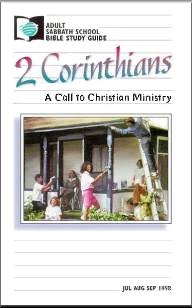





2 CorinthiansA Call to Christian Ministry Introduction |
 |
As we study 2 Corinthians this quarter, we see also Paul's reasoned arguments and enthusiasm for the gospel. All these things are present in his Second Epistle to the Corinthians. But we also find something more. We find what is perhaps Paul's most personal letter. Here we see him not only courageous and triumphant but deeply concerned and personally threatened. In I Corinthians we learn about conditions in Corinth; in 2 Corinthians we learn about conditions in Paul.
While reading this letter, it is tempting to feel
disconnected from it. After all, Paul's disagreements with the
Corinthians and discussions about the legitimacy of his apostleship are
hardly front-page news today. On second thought, though, the
letter is all about ministry. And if we are to fulfill the commission
to take "this gospel of the kingdom" into "all the world," we surely
need to study it with care. From Paul's experiences as he records them
in his second letter to the church in Corinth, we may learn the
following about how to improve each of our own personal ministries:
1. What it means to minister on Christ's behalf;
2. How to create a personal ministry based on the Cross of Christ and
His resurrection;
3. What the true qualities of an effective ministry are; and
4. How our weaknesses can become the genius of our ministry. To outline
2 Corinthians in such a way may seem to miss much of the excitement
that pulses through its pages. But as you study and learn from this
outline, Paul and his emotions will become real and meaningful. You
will begin to sense his drive and relate to his mission. You
will, indeed, find yourself enlisting on Paul's missionary team, eager
for the joys and sorrows of the most exciting and demanding challenge
ever to face a human being-Christian ministry.
Contents: (no frames)
Meet the Principal Contributor to This
Quarter's Lessons
John McVay is associate professor of biblical studies and chair of the Religion Department at Pacific Union College. He has been at the college since 1985, including a period of service as the senior pastor of the Pacific Union College church. He enjoys nothing more than participating with young adults as they grapple with the eternal themes of the Bible.
John was born in Corvallis, Oregon, to a pastoral family. He felt the call to pastoral ministry early in life, following in the footsteps of his father, Ken, and older brother, Bill. While still in college, he served as youth pastor in Des Moines, Iowa. He ministered in the Georgia-Cumberland Conference before coming to California.
John is a graduate of Georgia-Cumberland Academy, Southern College, Andrews University, and England's Sheffield University, which awarded him a Ph.D. in New Testament studies in 1995. His dissertation focused on the theme of the church in the Epistle to the Ephesians. In 1996 John was selected by the students and faculty of Pacific Union College as "Educator of the Year." He contributes regularly to professional conferences and publications.
John is married to Pam Aalborg McVay, who works part time as an obstetrics nurse at St. Helena Hospital. They have two children, Marshall and Macy. The family enjoys the great outdoors, especially camping in Northern California.
Last updated on June 7, 1998
Editorial Office:
12501 Old Columbia Pike, Silver Spring, MD 20904.
Principal Contributor: John McVay.
Editor: Philip G. Samaan .Associate Editor: Lyndelle Brower Chiomenti.
Editorial Assistant: Soraya Homayouni Parish.
Art and Design: Lars Justinen. Pacific Press Coordinator: Glen
Robinson.
Copyright © 1998 General Conference of Seventh-day Adventist. All Rights Reserved.

